When Do Babies Say Mama? Baby Language Development
Babies bring immense joy into our lives. Their soft giggles, squishy cheeks, and cuteness fill our hearts with warmth and happiness. A baby enables us to view life from a whole new perspective. They increase our joy and bring meaning and purpose into our lives. Children make our lives better in many ways and show us what it means to be truly alive.
The happiness babies bring into our lives intensifies when they utter words for the first time. Hearing them say mama or dada is bound to smile our faces for the first time. But when do babies say, mama? By 12 months, your baby will be able to pronounce mama and dada correctly. This communication skill can also develop in ten months.
Your baby might start talking mainly depending on your language development skills. Your baby will achieve small milestones first, such as developing various cries or cooing before they can utter words. Hence to predict when your baby will call you mama, it is essential to know about these language development skills first.
Language Development In Babies
From an early age, babies try to express themselves in different ways. These small steps towards effective communication enable them to move forward to their big step, uttering words correctly. Babies learn how to express themselves slowly and start understanding your terms.
These small gestures at the start enable them to utter words. And here’s a rundown of how your babies develop their communication skills to utter their first word.
From Three To Four Months
You’ll notice that babies develop different methods to communicate with you as they grow from the very beginning. They start crying when they are hungry or sleepy. They will also begin to giggle when they are happy. These are the primary methods your baby will try to communicate their needs to you.
In three to four months, your baby might start to express themselves by meeting their eyes with yours. They will start making eye contact more frequently than before. Your baby will also begin to express their needs in various other ways.
They start making numerous sounds by combining vowels and consonants. Your baby will also begin mumbling and making different kinds of crying sounds. Babies start making these noises to grab your attention.
Based on their cries, you will be able to figure out what they need. From three to four months, your baby will develop different cries for various needs. They start noticing your speech and tone, which plays a significant role in developing their speech later.
They also start smiling back at their parents. During this period, they also begin making soft noises when they laugh. Now that they have discovered their voice, they start making small sounds like “ah” or “oh” and many more. These are the first steps your child will take toward their speech development.
From Five To Seven Months
Since they carefully notice how you speak, they have started to imitate it for five to seven months. They start copying the noises you make. Babies also begin to catch the tone and the pitch of the words. They try to imitate those sounds with the same angle or style.
They start to mimic some of the sounds they like. During this period, babies also learn to express themselves by gestures. They will be waving goodbye, pointing at a toy, making noises to make you realize they do not like something, clapping at the top they love playing with, etc.
Your baby will also start experimenting with sounds. They will try to replicate your speech and the sounds you are making. Your little one will begin making sounds while looking at their toys and squeak with happiness. They will be able to communicate through their body language more effectively.
It might sound like they are making random noises when they are babbling. But if you listen closely to them, you will realize they are trying to mimic the sounds they are hearing. These random noises your baby makes are also known as baby babble. Also, they will get better at using facial expressions to hint about their likes and dislikes.
They start making longer sounds and different kinds of sounds. Your baby will be able to pick up similar-sounding words. They will also try to mimic the words they are familiar with. Your babies will also love it when others are talking to them, and they begin exploring how they can express themselves.
From Eight To Nine Months
Babies start to communicate in longer syllables. Their blabbering starts making sense, and they are slowly trying to form words. They begin to understand you more during the first eight to nine months and can even respond when you call your child by his name. He can now understand more of what you are saying and even react to it.
While babbling, your baby will try to repeat the same sound and exact words. Even though their motor skills are not fully developed, they will be able to understand you. They might even pronounce the words mama and dada. But they won’t know the meaning of these words yet.
From Ten To Twelve Months
Their gestures will become more evident. They will be able to ask for something specific. They will be able to greet people and vigorously deny something they don’t want. Simple gestures like saying hi, giving a high five, or saying no to the food they dislike will become a piece of cake for them. They will be able to communicate more clearly and more quickly than before.
During this period, they will be able to identify individuals and call them out. Hence, during ten to twelve months, they call out mama by referring to you. If you give them a toy and say, take this to daddy. They will carry the toy and hand it over to him!
They will be able to understand the intonations of your voice. For instance, by the sharp tones of your voice, they will realize that they are being told not to do something. Your babies will be able to focus on the tone of your voice and shape their actions accordingly.
They will also respond to their names being called and will be able to carry out simple instructions. Babies will gain more control over their voices and try to use them more often. They will also laugh and enjoy you playing games with them, peekaboo being one of them. Your baby will be able to mimic the game in the same way you are playing with them.
From Thirteen To Eighteen Months
The moment your baby utters the first word, he will try speaking more and more. Babies will try to expand their vocabulary as much as they can. They will keep adding new words and start to experiment with them. Hence, during this time, be prepared for a chatterbox as your baby will ask many questions during this period.
Babies will be able to pronounce words more clearly than before. They will call out to you more often, and these are genuinely heartwarming moments to hear them call out. They will also try to name things they see in their everyday lives, such as their toys or food.
Babies usually experiment with one or two words from thirteen to eighteen months. Still, they will start to develop more quickly than you realize. A language explosion occurs later, and before you know it, your little one who used to babble will begin to construct perfect sentences!
When Should You Start Worrying If Your Child Isn’t Talking?
If your baby isn’t communicating with you by 12-15 months, then it’s high time you consult a doctor. The doctor will assess your child’s hearing and speech assessing capabilities to see if there’s any deep-rooted problem behind this.
The small steps, expressions, and gestures your baby uses during the first few months are essential for developing their communication skills. These gestures and expressions are known as pre-verbal skills. You can predict the outcome of your child’s language skills by observing their pre-verbal skills.
The pre-verbal skill is a pillar that acts as a building block in your child’s language skills. Understanding your words and responding to them are some of your baby’s small steps towards growth. The more pre-verbal skills they gain, the more effectively they will be able to communicate with you.
Hence, the blabbering of words, pointing at something, developing different cries for different needs, and smiling at their favorite toys are building blocks of their language skills. Hence, these pre-verbal skills are not something to leave out of the picture. These are fundamental skills your child must acquire from an early age.
Some children are early talkers, whereas some children are late talkers. Hence, the child’s speech development skills heavily depend on the child. But if the baby is not picking up pre-verbal skills, there’s a high chance that there’s a deep-rooted problem here. Babies should be able to respond to you and should be able to use their voices to announce their needs.
By 12 months, your baby should be able to recognize everyday objects such as their baby bottles or diapers. They should also be able to name them and even call you out. If your child is observing but isn’t responding to any noise, then there’s a high chance that your child is showing symptoms of hearing loss.
If your child has a problem imitating your words by 18 months, that is a concern. Suppose they also feel comfortable expressing themselves by gestures but not words. In that case, it is also a matter of concern. If your child cannot understand simple instructions, it is also concerning.
If your baby’s language skills gradually decline and they are not making eye contact anymore, their babbling decreases significantly. Then it is better to consult a speech-language pathologist in these situations. Also, you must notice these symptoms early on and consult a doctor. It is better to be safe than sorry.
How Can You Help Your Child In Speech Development?
Language skills are incredibly crucial for your child’s development. The pre-verbal skills are the early symptoms of your child’s growth. Hence, they play an essential role in determining your child’s communication skills. The best way to help your child’s speech development is by talking to them more and more often.
The more they listen, the better they get at communicating. But there are other ways to help your child’s speech development. Here’s a rundown of those easy steps.
Talk A Lot
Parents play an essential role in developing their baby’s language skills. Hence, talk to them a lot. Talk to them about anything and everything. Describe your daily activities to them. The more they listen to you, the better they get at impersonating those words. Extended exposure to language is the best way to boost your child’s language skills.
Your baby will pick up more sounds the more you talk to them. They will try to utter your words, too, and will try to copy you. Hence, it is also highly recommended that you use different tones and pitches while talking to them. Using other tones will enable them to learn and mimic new sounds, which will enhance their communication skills.
Try to have a daily conversation with your baby, as you would typically have with an adult. After speaking, pause for a minute, and see if your baby responds to your words after listening to you. Also, you can try explaining your baby’s pre-verbal skills to them.
Talking with your baby at eye level also has major advantages. At eye level, your baby can see your face more clearly. Hence, they will be able to watch and observe how your mouth moves when you are forming words. This will allow them to copy your words faster, enhancing their pre-verbal skills.
If your baby is babbling or gesturing at their baby bottle, ask them if this is what they want. Explain their babbling or gestures to them in the form of a sentence. In this way, your baby will also learn to express their needs in words. Hence, talking a lot with your child will most assuredly bring you satisfactory results in your child’s language skills.
Reading
Reading is an essential part of boosting a child’s language skills. The more they hear, the better they get at communicating. Hence, reading to your child from an early age is recommended. Babies can be more attracted to picture books or board books. You can narrate a story during their bedtime and let them go through the pictures.
Try to read to them using various voices and mimic each character’s voice in the story. Using diverse cartoon voices will make your baby listen attentively to the story and keep them glued to your voice. Reading to them enhances your baby’s language skills and encourages them to read from an early age.
It is also vital that you read to your child correctly. Suppose you are tired and just rushing through the pages to end the storybook. It’s not going to do your child any good. Hence, rather than finishing the storybook hurriedly, you should pronounce the words with more force and impersonate the characters’ voices.
This will help your child’s growth in terms of speech development and also encourage them to interact with you. Ask them questions about the story’s characters; observe how they respond to you.
The more time you spend reading books, the more time you spend with them will most assuredly boost their language skills. It is also beneficial for your child’s future as they will pick up the habit of reading books from an early age.
Listening To Music
Children love music. Exposing them to music, rhymes, and poems will build up their language skills and help them learn about the rhythms of language.
It will boost their creative skills, and they will be able to combine sounds in their ways. They might even try to invent their own words!
Follow Your Child’s Lead.
If your baby is heavily interested in a particular storybook and wants to keep hearing about it more, then lead on with it. If your child is gesturing or babbling towards rhymes, then lead on with it. Grasp your baby’s attention. The more interest your baby shows in something, the more likely they will try to impersonate it more readily.
Keep talking about the things your baby loves. If she loves the flowers, describe the flowers to them. Keep your baby’s attention fixated on you and interact with them. In return, they will try to communicate more with you as well. Hence, this will build up your child’s communication skills and boost their language skills.
Plan Play Dates
If your child meets with someone their age, this will help them interact more. Hence, you can organize meetings with other children so that your child can interact with them. Even if they babble together, it’s still an effective interaction. Your baby will be able to communicate their needs better, and interacting with peers can never go wrong.
Now a group of babies isn’t going to be that chatty, but if they interact with pre-verbal skills, that is beneficial. These small steps act as building blocks to their communication skills and increase their vocabulary. Interacting with babies of their age will help them develop good social skills from an early age. It will help them develop language skills as well.
Treat Ear Infections Thoroughly
Ear infections are widespread in babies, and if they are not appropriately treated, they can result in severe symptoms. Untreated ear infections can result in hearing loss, which might hamper your child’s language skills.
Hence, it is best to regularly undergo thorough checkups by pediatricians, as it is necessary to keep your child’s growth in check.
Give Him Feedback
Giving feedback to your child is important for your child’s developing skills. If you criticize or react to their way of speaking negatively, there’s a high chance that they won’t even try anymore. Hence, you must respond to their attempts at forming words positively and encourage them to speak more.
Suppose your baby looks at a chair and points at it, saying ‘Cha’! It’s magnificent; that’s how your baby will grow. So look at her and say yes, that’s a chair. Speak the proper pronunciation to them, but never discourage them. Also, it’s better if you don’t tell your child that it’s not “cha”; it’s a chair. You don’t have to correct them. They are learning, and that’s how it works.
They will mumble out broken words and sentences first, and that’s how their speech will develop. So there’s no rush to correct them every time. You just need to speak the correct pronunciation to them so that they hear the right words and learn. But there’s no need to pressurize your child into speaking properly at a quicker rate.
Each child will develop at their own pace, so there’s no need to hurry. Give them positive feedback and encourage them to talk more and more often. This step will work wonders for your child’s language skills.
Piggyback Words
Your baby will start to use two-word combos when learning the first communication steps. Hence, they will most likely join two words or try to speak in two-word combos to express themselves. Your baby might utter ‘eat cookie’ or ‘play toys.’ They will most likely join an action word with a noun.
It is best to repeat their sentences during these situations, adding another word or two. For instance, if they say ‘eat a cookie,’ you can reply by saying, ‘yes, you can eat these tasty cookies.” In this way, your child’s vocabulary will increase, and they will try to interact using more words the next time.
Instead of two-word combos, your baby’s vocabulary will increase to three words or four-word combos. Learning new words will heighten your child’s communication skills. Your child will be able to acquire language skills faster than before.
They will also try to mimic you and will try to add the exact words that you used. This method will also encourage them to speak more and more often using different words. Hence, your child’s language skills won’t be confined to using a word or two, which will improve much more quickly.
Cut Down On Television Time
Educational shows on television are highly beneficial. Also, every child loves watching cartoons, but exposure to TV for an extended time might be doing more harm than good. Your child doesn’t need to interact while watching a cartoon. They are just sitting there with their eyes fixated on the television screen.
The most basic steps to boost your child’s language development skills are talking with them and encouraging them to respond. By watching cartoons for an extended period, your child is not interacting during those multiple hours. Hence, for their healthy growth, it is better to cut down on television time.
Instead of television, giving them an exciting alternative such as playing or listening to rhymes is better. It’s better to keep your child away from long-time screen exposure from an early age. Two hours is sufficient for television time, but more than that isn’t right. Your child should instead participate in activities that will prove beneficial to their developing skills.
Conclusion
Your child uttering the word ‘mama’ unravels a brand new identity of yours. This new identity of yours is something you could have never experienced without the presence of a child. Every parent waits for this endearing moment to occur. Hearing your child call out to you for the first time is truly an emotional moment.
Hence, when do babies say mama? This is truly the most anticipated question of every parent, and this question does have quite a simple explanation. Look out for their pre-verbal skills. Keep interacting with them and observe their response. By 12 months, these skills should gradually appear, and acquiring these steps means your child will soon utter their first words!
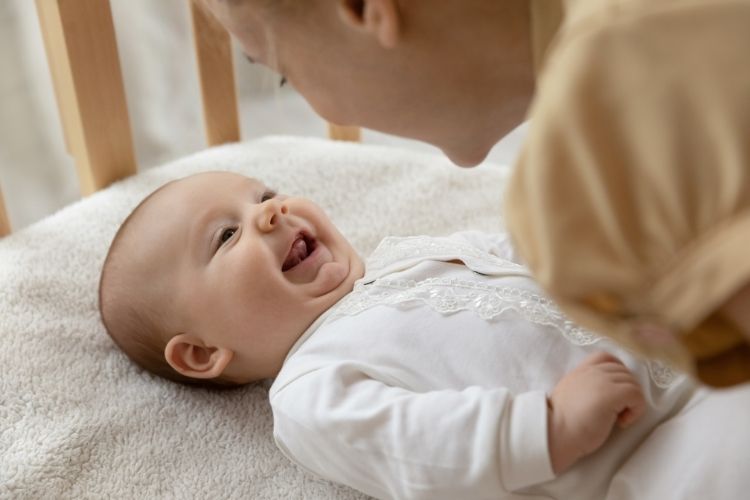

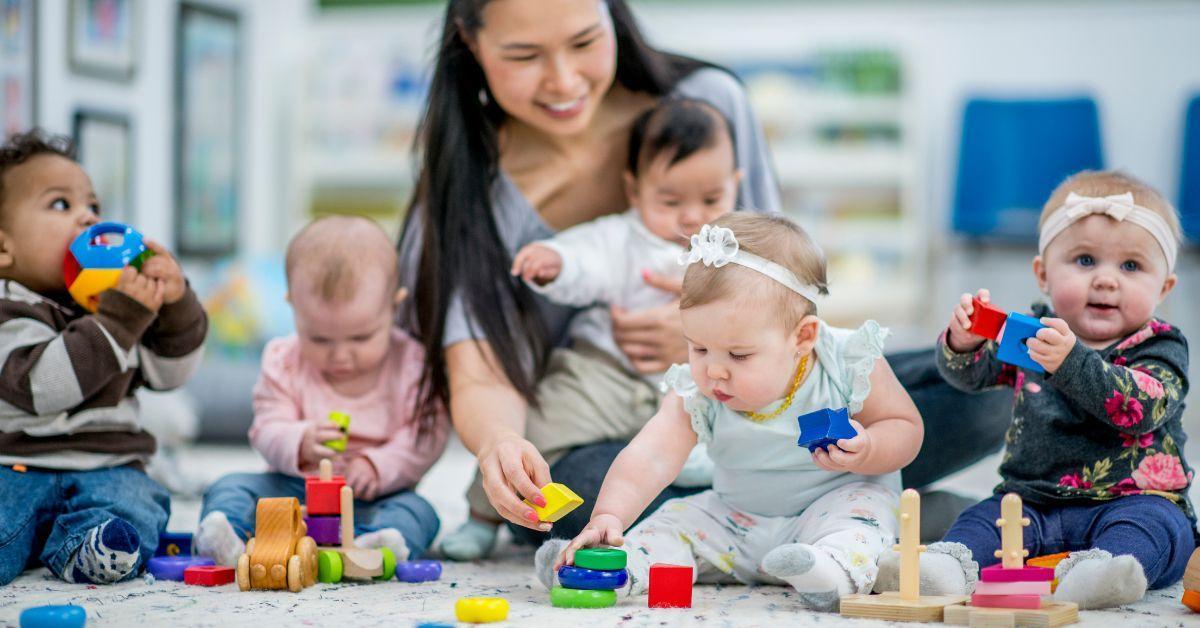
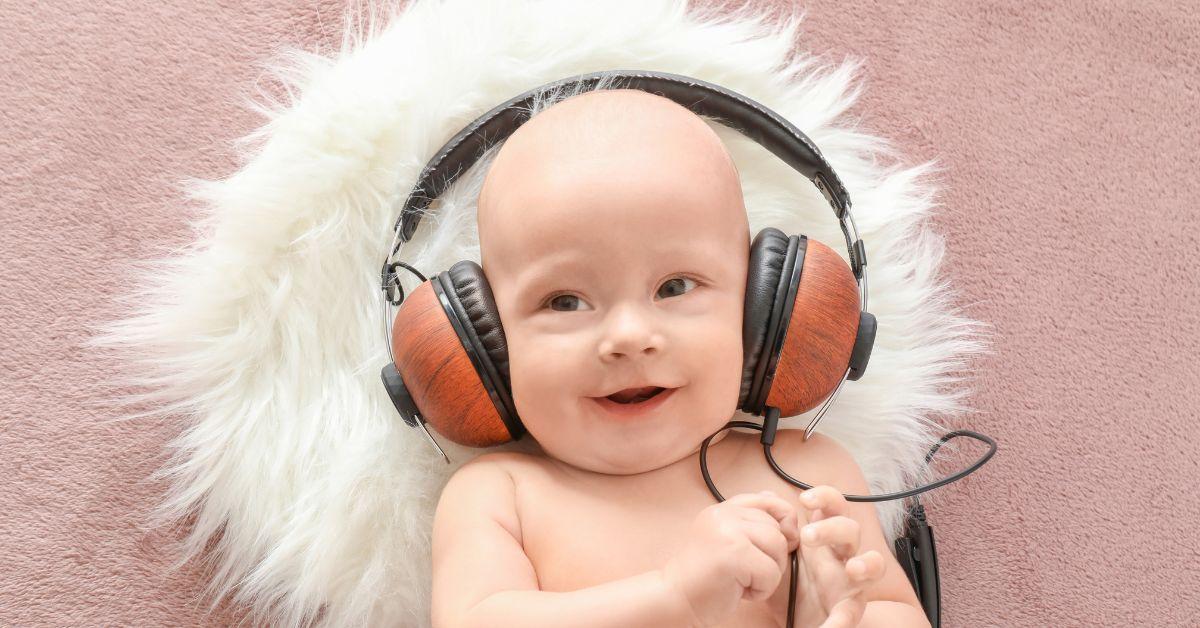
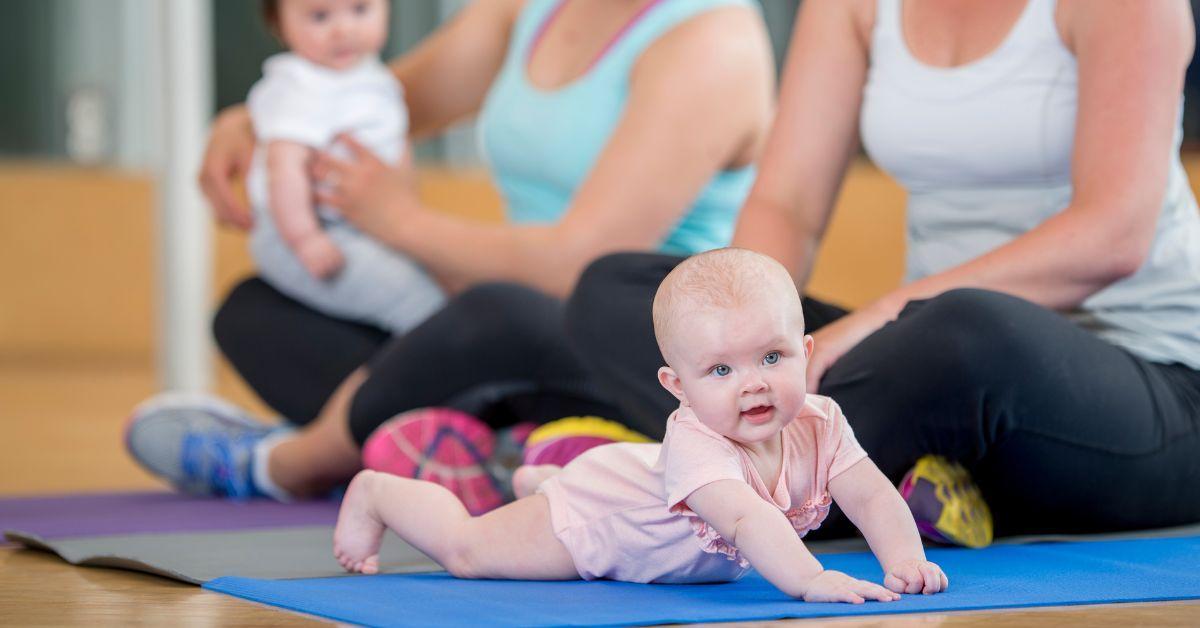
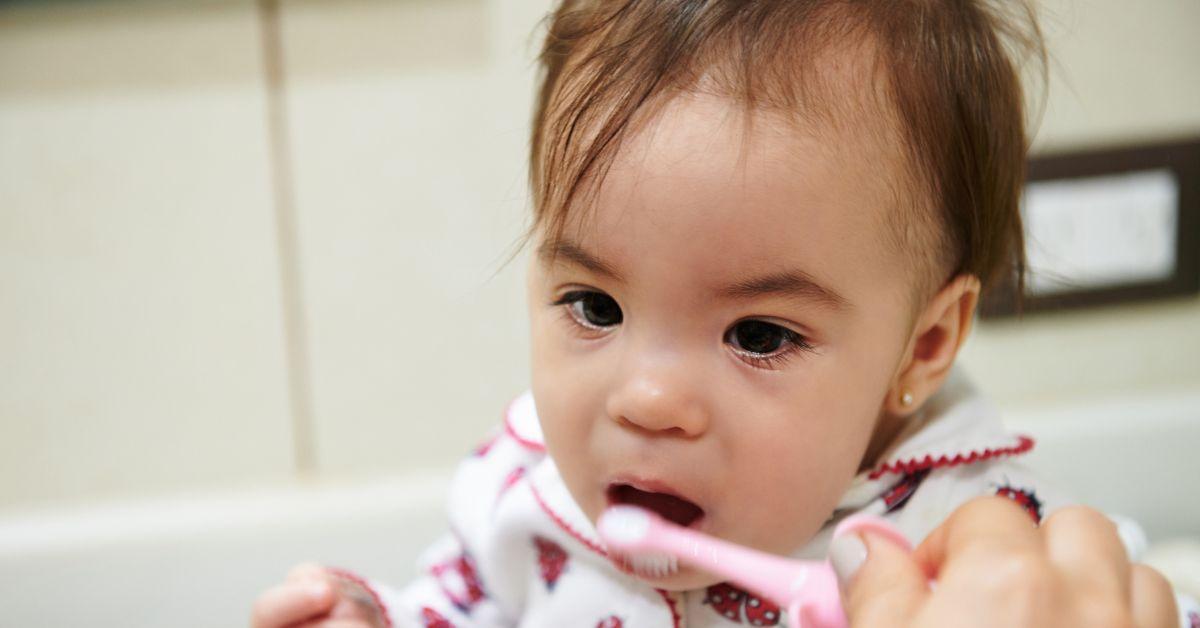
Jennifer Crowley
I'm Jennifer, a dedicated mother passionate about writing insightful blog posts. My life revolves around the joys and challenges of parenting and brings my unique perspective and experiences to writing, with a keen eye for detail and a love for storytelling. My blog is a platform for sharing parenting tips and advice and a place where I want to be with other moms and dads, offering them a sense of camaraderie in the wonderful, chaotic world of parenthood.